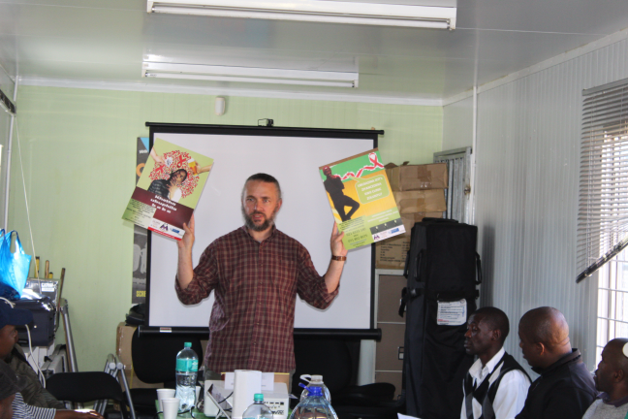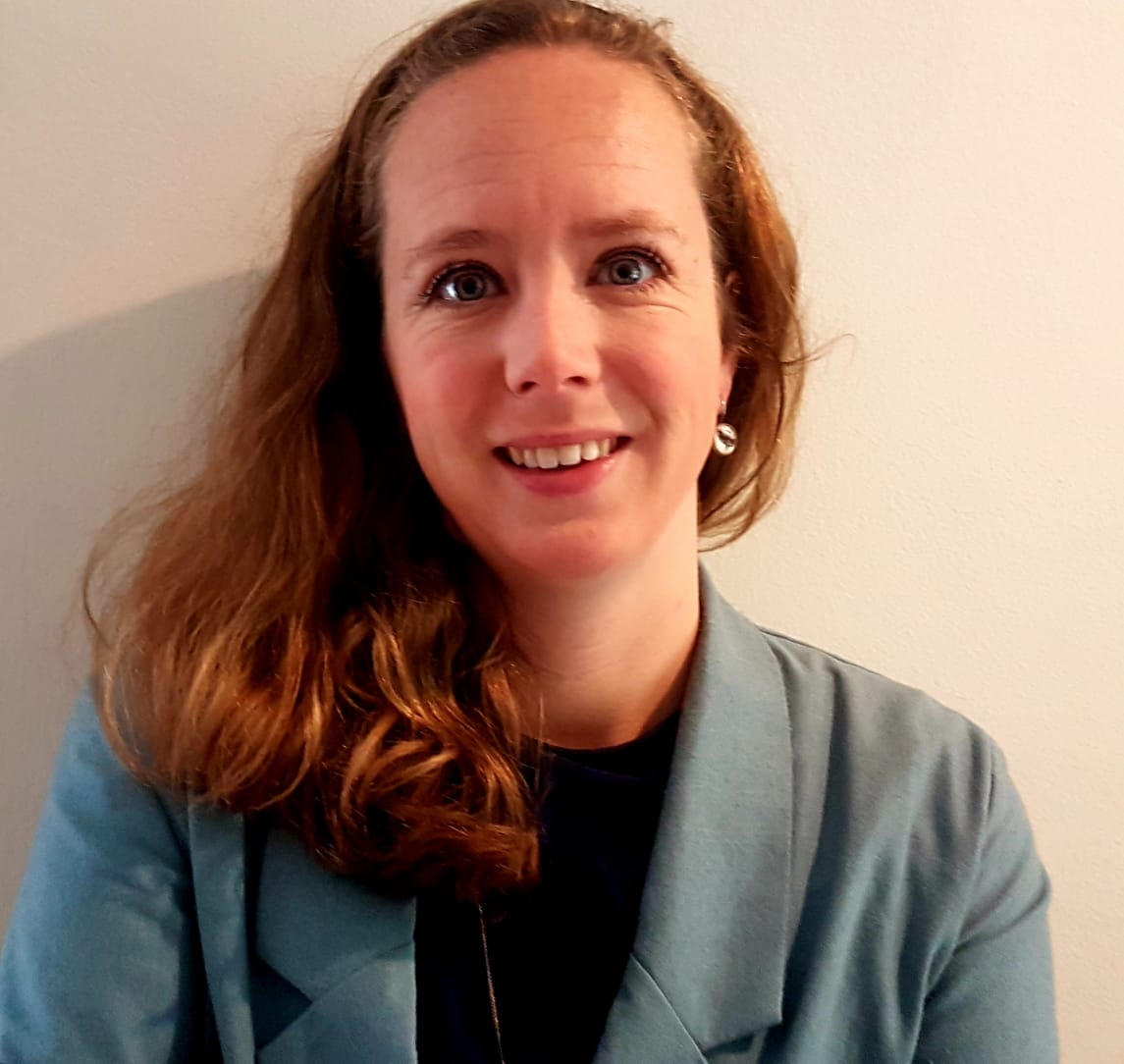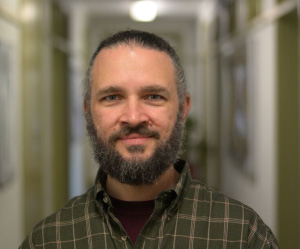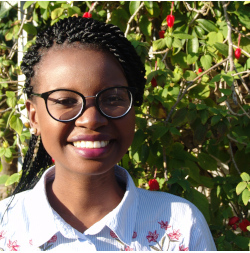Connection, Community and Communication: A Reflection of the Successes and Challenges When Conducting Health Systems Strengthening Research to Better Link Men to HIV Care

Myrna van Pinxteren (Researcher, UCT); Christopher Colvin (Researcher, UCT); Nonzuzo Mbokazi (Researcher, UCT)
Editorial Note: Myrna van Pinxteren, Christopher J. Colvin and Nonzuzo Mbokazi all work for the iALARM project, one of the flagships studies within the Division of Social and Behavioural Sciences that focuses on the linkage of men to HIV care in Gugulethu and strengthening of health services in the area. For this piece, they reflect on the highlights of the iALARM project of the past years and share some plans for 2020.
In the response to the HIV epidemic, men are often under-acknowledged, under-represented and under-researched, making them the ‘forgotten fifty percent’.1 This is no different in South Africa, where men are less likely than women to test for HIV and often seek health services when they are already sick. Globally, of those living with HIV, 48% are men. Furthermore, men account for 60% of AIDS-related deaths worldwide. These poor outcomes for men can be partly attributed to men not seeking or adhering to treatment, which in turn can be explained, in part, by pervasive hegemonic masculine identities that delay men’s care seeking. Equally significant, however, are the fragmented and overburdened public health services in South Africa which typically do not adequately address the needs and preferences of men.2 There is a need to rethink how we can more effectively and meaningfully integrate men into existing services, strengthen the existing health services as well as actively promoting men’s health within the community.
Improving the lives and health of men has been the focus of the iALARM research project over the last five years. iALARM, which stands for ‘Using Information to Align Services and Link and Retain Men in the HIV Cascade’, commenced in 2015 and is funded by the National Institute for Mental Health (NIMH), the South African Medical Research Council and the National Research Foundation, and is based in Gugulethu, a township in Cape Town, South Africa. The iALARM team works closely with Sonke Gender Justice and the Movement for Change and Social Justice (MCSJ) and focuses on both getting men’s health onto the national and international research agenda as well as addressing their needs in the community. As a research study, the iALARM project also aims to nuance some of the ideas around pervasive hegemonic masculinities which are still alive within the public health discourse.3 Heterosexual men, and African men in particular have been portrayed as dominant, overpowering women and taking little responsibility for their own health. Furthermore, men are often seen as a homogenous group, not acknowledging the complexity of gendered behaviour which both men’s and women’s health seeking practices and the HIV response at large.4

One of the aims of the iALARM project is to map the health care needs of men in Gugulethu and surrounding communities and to better understand the barriers men experience when trying to link and stay in HIV care. Over the years, the iALARM study has collected qualitative data on men’s use of health service, their challenges when testing for HIV, and their motivations to remain engaged in care. In the past year, the iALARM team welcomed two international students from Brown University—Aly Beeman and Ana Lucia Espinosa Dice—who mapped out the mobility of HIV+ patients in Gugulethu. Nonzuzo Mbokazi (UCT) and Yandisa Sikweyiya (SA-MRC) are also conducting case studies in Gugulethu that aim to evaluate how male-centred services can improve the uptake of HIV care among men, and how male-focused interventions such as men’s dialogues might shape men’s thinking and health practices. These case studies are designed to appraise the improvement in communication and coordination of HIV services in Gugulethu. Together, these projects identify the difficulties men experience when seeking treatment and aim to inform future studies and male-focused interventions to improve men’s health in Gugulethu and beyond.
Another aim of the iALARM study to actively connect and engage stakeholders from different levels of the health system and community actors to discuss the health services in Gugulethu and advocate for better engagement with men in these health services. To aid the communication and information sharing between these groups of actors who normally would not be linked together, the iALARM team set up a Task Team (TT), which comes together every two months to discuss HIV data and share experiences of working with male patients. The TT has been running since 2017 and has sparked relationships between individual health workers, improved communication between clinics, NGOs and community members, and has led to several follow-up projects and requests for health information. Chris Colvin and others have published an article about the impact of the TT and Nonzuzo Mbokazi and Myrna van Pinxteren are currently working on an evaluation that qualitatively measures the impact of the TT over time.

Besides actively linking health actors and community activists with each other to improve communication, the iALARM study also makes an effort to share research findings about HIV care in the community on a large scale. In 2018 and 2019, iALARM organised a ‘UCT-Gugulethu Research Indaba’, where we invited local and international researchers and service providers to speak to community members. Both Indabas were well attended, as we welcomed more than 700 community members from Gugulethu and surrounding areas. In plenary and break-out sessions, we shared findings from research in South Africa and beyond, including topics such as HIV & masculinity, medicine use among pregnant women, community engagement, and the development of new health interventions. In between sessions, there was time for informal discussions and live entertainment. Several clinics offered HIV, blood pressure and diabetes testing, pap smears and counselling services. Local NGOs and organisations had an opportunity to promote their programmes and services. The positive responses and large number of attendees at these Indabas show a real hunger among researchers, health systems representatives and community members to actively engage with academic data outside of the university space. These community meetings offer a space for a renewed focus on men’s health whereby real-life experiences are triggered by opening conversations which are sparked by sharing academic evidence.
To further promote men’s health in the international research arena, Morna Cornell and the rest of the iALARM team has been working to actively link researchers in Africa and beyond together by organising ‘Men and HIV’ networking meetings. During the last meeting, findings were shared from research studies and interventions in Cape Town, Kwa-Zulu Natal, the Eastern Cape and Malawi, sparking conversations on rethinking health programmes and strategies to engage men in care. Morna Cornell, Chris Colvin and Isaac Mangwana also represented the iALARM team at the IAS Conference in Mexico in 2019 where they were joined by more than 150 other health researchers, NGOs, and international organisation to ‘raise the alarm’ about the invisibility of men in the HIV response. Additionally, Chris Colvin was invited by Lancet HIV to write a review article about strategies for engaging men in HIV services. These and other efforts are all aimed at adding men’s health issues to the international research agenda and challenging global funders and agencies such as UNAIDS and the Global Fund to actively work on solutions to improve health services for men around the world.

To increase the visibility of men in the HIV epidemic and actively promote men’s health both within the global research arena as well as in local programmes, there is a need to actively also expand research capacity and train junior researchers in qualitative methodologies and social sciences, two of DSBS core competencies. This is achieved by offering a new programme, BRIDGES, whereby a number of PhD candidates and post-doc fellows from South Africa are receiving tailor-made post-graduate training, and by running a series of short courses to students and researchers, focusing on qualitative data analysis, qualitative evidence synthesis (QES) and a gender theory course.
The year 2020 marks the final year of the iALARM project. In the past five years, we have achieved many of our milestones, but at the same time only scratched the surface of what is needed to meaningfully strengthen HIV services for men and nuance the ideas around gendered health practices and masculine identities preventing men from seeking care. The iALARM team aims to use this year to push academic outputs, further expand theory- and skills-building practices, and strengthening relationships with both community members in Gugulethu and beyond, as well as within the international research community. We will do this by organising regular TT meetings, hosting the third Research Indaba and having regular conversations within the public health research community. We are committed to continuing to raise the ALARM about the important of equal and appropriate engagement of men and women in the HIV response.
Keep updated on the latest news and publications by visiting www.ialarm.org.za.
References
1. Varga CA. The forgotten fifty percent: A review of Sexual and Reproductive Health and Program Focused on Boys and Young Men in Sub-Saharan Africa. Women's Health and Action Research Center (WHARC) 2001; 5(3): 175 - 95.
2. Cornell M. Gender inequality: Bad for men’s health. Southern African journal of HIV medicine 2013; 14(1).
3. Poulin M, Dovel K, Watkins SC. Men with Money and the “Vulnerable Women” Client Category in an AIDS Epidemic. World Development 2016; 85: 16-30.
4. Dovel K, Yeatman S, Watkins S, Poulin M. Men’s heightened risk of AIDS-related death: the legacy of gendered HIV testing and treatment strategies. AIDS (London, England) 2015; 29(10): 1123.
Author Biographies

Myrna van Pinxteren holds a MSc in Social Anthropology and is a PhD candidate in the Division. As a qualified journalist and anthropologist, Myrna's research interests are focused around the use of communication and information to strengthen health care and the practical use of medical anthropology in everyday life.
Email: myrna.vanpinxteren@uct.ac.za

